第十一章 构词法 课件(共18张PPT) 2024年中考英语二轮专题复习(广东专版)
文档属性
| 名称 | 第十一章 构词法 课件(共18张PPT) 2024年中考英语二轮专题复习(广东专版) |
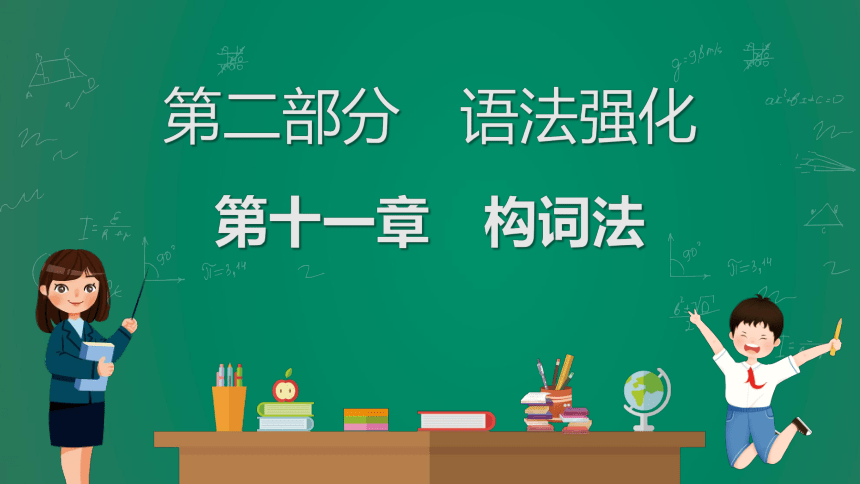
|
|
| 格式 | pptx | ||
| 文件大小 | 2.9MB | ||
| 资源类型 | 教案 | ||
| 版本资源 | 通用版 | ||
| 科目 | 英语 | ||
| 更新时间 | 2024-06-02 17:50:46 | ||
图片预览

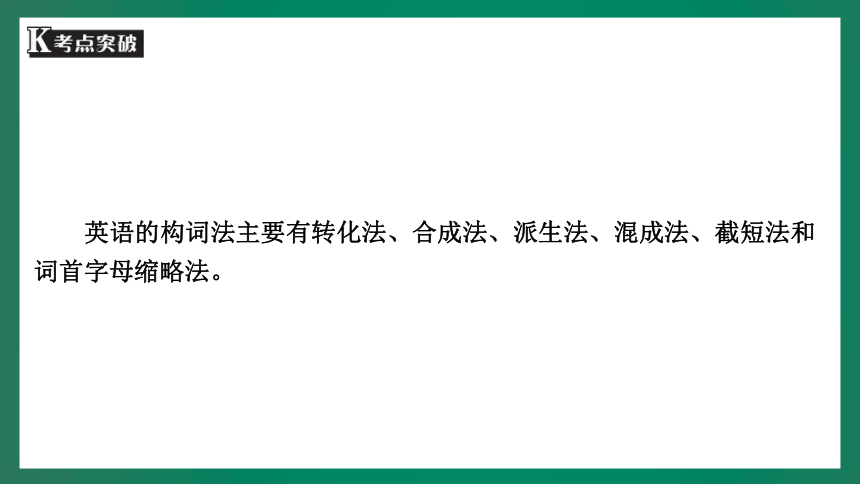
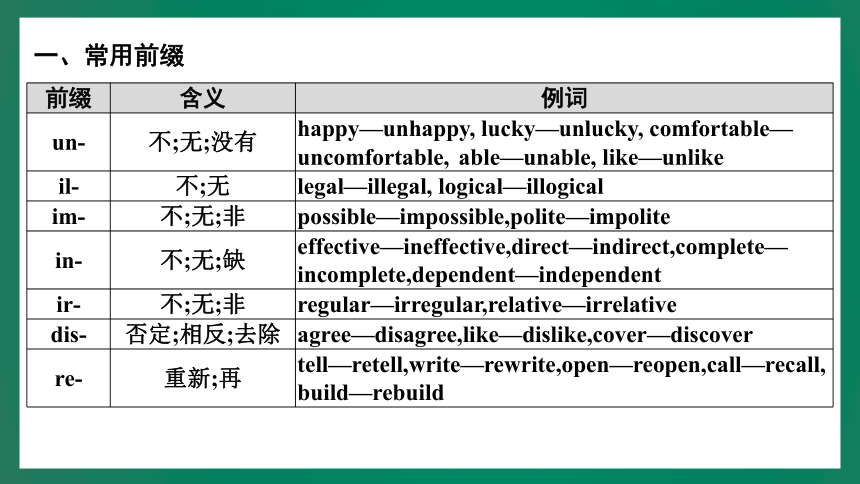
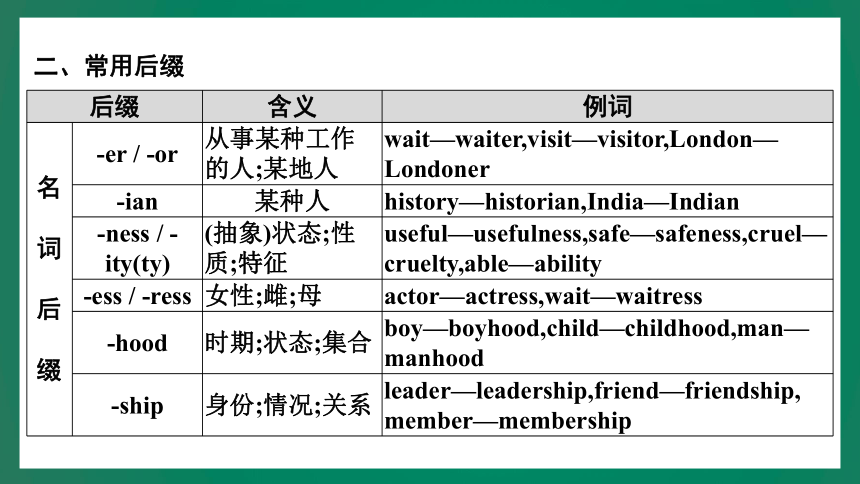
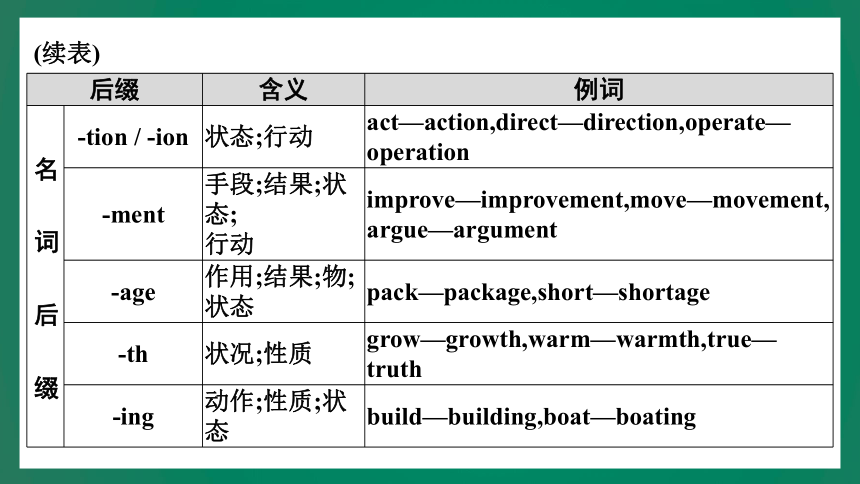
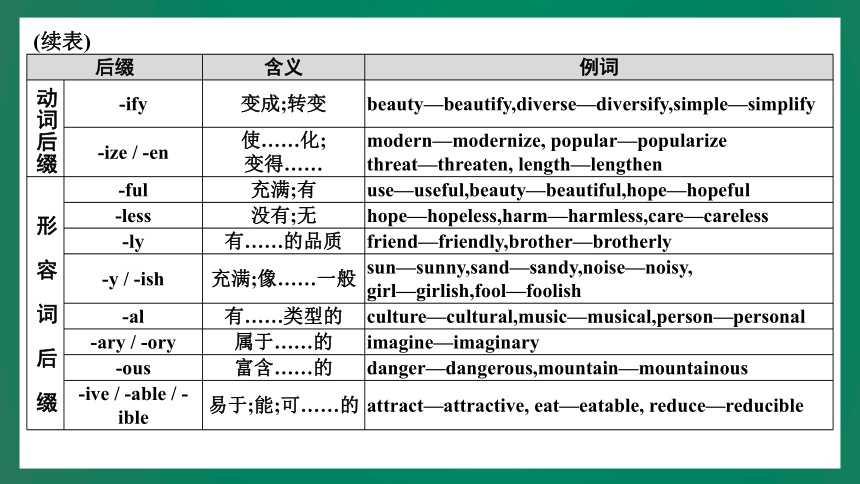
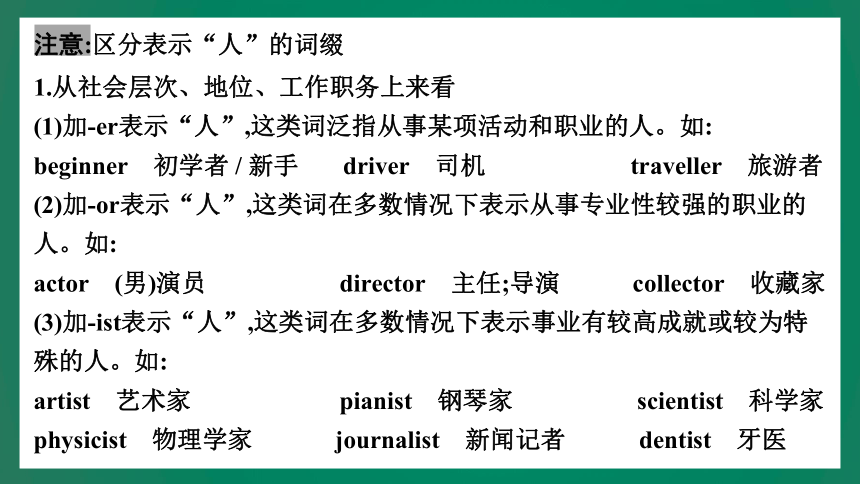
文档简介
(共18张PPT)
第十一章 构词法
第二部分 语法强化
英语的构词法主要有转化法、合成法、派生法、混成法、截短法和词首字母缩略法。
一、常用前缀
前缀 含义 例词
un- 不;无;没有 happy—unhappy, lucky—unlucky, comfortable—uncomfortable, able—unable, like—unlike
il- 不;无 legal—illegal, logical—illogical
im- 不;无;非 possible—impossible,polite—impolite
in- 不;无;缺 effective—ineffective,direct—indirect,complete—incomplete,dependent—independent
ir- 不;无;非 regular—irregular,relative—irrelative
dis- 否定;相反;去除 agree—disagree,like—dislike,cover—discover
re- 重新;再 tell—retell,write—rewrite,open—reopen,call—recall,
build—rebuild
名词后缀
二、常用后缀
后缀 含义 例词
-er / -or 从事某种工作的人;某地人 wait—waiter,visit—visitor,London—Londoner
-ian 某种人 history—historian,India—Indian
-ness / -ity(ty) (抽象)状态;性质;特征 useful—usefulness,safe—safeness,cruel—cruelty,able—ability
-ess / -ress 女性;雌;母 actor—actress,wait—waitress
-hood 时期;状态;集合 boy—boyhood,child—childhood,man—manhood
-ship 身份;情况;关系 leader—leadership,friend—friendship,
member—membership
(续表)
名词后缀
后缀 含义 例词
-tion / -ion 状态;行动 act—action,direct—direction,operate—operation
-ment 手段;结果;状态; 行动 improve—improvement,move—movement,
argue—argument
-age 作用;结果;物;状态 pack—package,short—shortage
-th 状况;性质 grow—growth,warm—warmth,true—truth
-ing 动作;性质;状态 build—building,boat—boating
形容词后缀
动词后缀
(续表)
后缀 含义 例词
-ify 变成;转变 beauty—beautify,diverse—diversify,simple—simplify
-ize / -en 使……化; 变得…… modern—modernize, popular—popularize
threat—threaten, length—lengthen
-ful 充满;有 use—useful,beauty—beautiful,hope—hopeful
-less 没有;无 hope—hopeless,harm—harmless,care—careless
-ly 有……的品质 friend—friendly,brother—brotherly
-y / -ish 充满;像……一般 sun—sunny,sand—sandy,noise—noisy,
girl—girlish,fool—foolish
-al 有……类型的 culture—cultural,music—musical,person—personal
-ary / -ory 属于……的 imagine—imaginary
-ous 富含……的 danger—dangerous,mountain—mountainous
-ive / -able / -ible 易于;能;可……的 attract—attractive, eat—eatable, reduce—reducible
1.从社会层次、地位、工作职务上来看
(1)加-er表示“人”,这类词泛指从事某项活动和职业的人。如:
beginner 初学者 / 新手 driver 司机 traveller 旅游者
(2)加-or表示“人”,这类词在多数情况下表示从事专业性较强的职业的人。如:
actor (男)演员 director 主任;导演 collector 收藏家
(3)加-ist表示“人”,这类词在多数情况下表示事业有较高成就或较为特殊的人。如:
artist 艺术家 pianist 钢琴家 scientist 科学家
physicist 物理学家 journalist 新闻记者 dentist 牙医
注意:区分表示“人”的词缀
2.从性别上来看
通常加-er / -or多为“男性”,加-ess多为女性。如:
waiter 男服务员 waitress 女服务员
actor 男演员 actress 女演员
3.从主动、被动上来看,加-er / -or为主动,加-ee为被动。如:
employer 雇主 (雇佣别人) employee 雇员 (被雇佣)
interviewer 面试者;采访者 interviewee 被接见者;被访问者;被面试者
4.有时会直接用表示人的单词来构词,如-boy,-girl,-man,-woman。如:
cowboy 牛仔 salesgirl 女店员 salesperson 推销员 workman 男工人 postman 邮递员
三、合成词
class (班级)+room (房间) → classroom (教室)
black (黑色的)+board (木板) → blackboard (黑板)
note (记录)+book (簿本) → notebook (笔记簿)
hide (躲藏)+ and (和)+seek (寻找) → hide-and-seek (捉迷藏)
即学即练
一、用括号里所给单词的适当形式填空。
1.(2022·扬州市中考改编)We youths do our best for our dreams and together a small success can give us a sense of _
(achieve).
2.(2023·永州市中考)China plans to pay more attention to scientific
(educate)in its primary and middle schools.
3.(2023·凉山彝族自治州中考改编)In my opinion,good friends should share (happy) or sadness with each other.
happiness
education
achievement
4.(2023·云南省中考)Amy is my best friend.She’s always there to be a good .(listen)
5.The book is very popular among the (visit).
6.We are amazed to see the (India) at the school gate.
7.The (post) is knocking at the door now.
8.Why do you want to be an (art) in the future
9.The government is working hard to reduce the (pollute).
10.The (advertise) are bad for the children.
11.You should think about the (difficult) in your study.
difficulties
advertisements
pollution
artist
postman
Indian(s)
visitors
listener
12.Can you tell me the (true)
13.Thank you for your (kind).
14.The audience is excited at the (perform).
15.They want to be (science) when they grow up.
16.He has more (confident) than Lily.
17.It’s my (please) to help you.
18. (fail) is the mother of success.
Failure
pleasure
confidence
scientists
performance
kindness
truth
即学即练
用括号里所给单词的适当形式填空。
1.He was so (happy) because he didn’t pass the exam.
2.The kid is so short that he is (able) to pick the apples on the tree.
3.Jim (like) running because he is too lazy.
4.Oh dear!It is (possible) to finish the work in such a short time.
5.Lucy is so (careful) that she often makes mistakes.
careless
impossible
dislikes
unable
unhappy
即学即练
用括号里所给单词的适当形式填空。
1.It is (cloud) today.
2.How (luck) she is!
3.She is a (love) girl.
4.It is (help) to do some sports.
5.We’d like to find a (comfort) room.
comfortable
helpful
lovely
lucky
cloudy
6.To swim in the deep water is (danger).
7.In the end,he became a (success) businessman.
8.The Great Wall is located in (north) China.
9.It is our duty to protect the (person) information.
10.We should be (act) in class.
11.The children were (excite) about opening their presents.
12.We have an (interest) day.
interesting
excited
active
personal
northern
successful
dangerous
1.一般情况下,直接加-ly。如:immediately,slowly,quickly
2.以y结尾的,变y为i再加-ly。如:luckily,happily,easily,healthily
3.以e结尾的,一般不省略,如closely,completely,safely,politely等。但是truly,holly和duly例外。
4.以-ble / -ple / -tle结尾的,去e加-y。如:terribly,possibly,gently
5.以元音字母加l结尾的,仍然要加-ly。如:finally,carefully,really,specially
即学即练
1.The little boy missed his mother (terrible).
2.It’s been raining (heavy) all day.
3.He read through the pages (careful).
4.We should speak (polite) when we talk to the elders.
5.Let me repeat (exact) what he just said.
exactly
politely
carefully
heavily
terribly
谢 谢 观 看
第十一章 构词法
第二部分 语法强化
英语的构词法主要有转化法、合成法、派生法、混成法、截短法和词首字母缩略法。
一、常用前缀
前缀 含义 例词
un- 不;无;没有 happy—unhappy, lucky—unlucky, comfortable—uncomfortable, able—unable, like—unlike
il- 不;无 legal—illegal, logical—illogical
im- 不;无;非 possible—impossible,polite—impolite
in- 不;无;缺 effective—ineffective,direct—indirect,complete—incomplete,dependent—independent
ir- 不;无;非 regular—irregular,relative—irrelative
dis- 否定;相反;去除 agree—disagree,like—dislike,cover—discover
re- 重新;再 tell—retell,write—rewrite,open—reopen,call—recall,
build—rebuild
名词后缀
二、常用后缀
后缀 含义 例词
-er / -or 从事某种工作的人;某地人 wait—waiter,visit—visitor,London—Londoner
-ian 某种人 history—historian,India—Indian
-ness / -ity(ty) (抽象)状态;性质;特征 useful—usefulness,safe—safeness,cruel—cruelty,able—ability
-ess / -ress 女性;雌;母 actor—actress,wait—waitress
-hood 时期;状态;集合 boy—boyhood,child—childhood,man—manhood
-ship 身份;情况;关系 leader—leadership,friend—friendship,
member—membership
(续表)
名词后缀
后缀 含义 例词
-tion / -ion 状态;行动 act—action,direct—direction,operate—operation
-ment 手段;结果;状态; 行动 improve—improvement,move—movement,
argue—argument
-age 作用;结果;物;状态 pack—package,short—shortage
-th 状况;性质 grow—growth,warm—warmth,true—truth
-ing 动作;性质;状态 build—building,boat—boating
形容词后缀
动词后缀
(续表)
后缀 含义 例词
-ify 变成;转变 beauty—beautify,diverse—diversify,simple—simplify
-ize / -en 使……化; 变得…… modern—modernize, popular—popularize
threat—threaten, length—lengthen
-ful 充满;有 use—useful,beauty—beautiful,hope—hopeful
-less 没有;无 hope—hopeless,harm—harmless,care—careless
-ly 有……的品质 friend—friendly,brother—brotherly
-y / -ish 充满;像……一般 sun—sunny,sand—sandy,noise—noisy,
girl—girlish,fool—foolish
-al 有……类型的 culture—cultural,music—musical,person—personal
-ary / -ory 属于……的 imagine—imaginary
-ous 富含……的 danger—dangerous,mountain—mountainous
-ive / -able / -ible 易于;能;可……的 attract—attractive, eat—eatable, reduce—reducible
1.从社会层次、地位、工作职务上来看
(1)加-er表示“人”,这类词泛指从事某项活动和职业的人。如:
beginner 初学者 / 新手 driver 司机 traveller 旅游者
(2)加-or表示“人”,这类词在多数情况下表示从事专业性较强的职业的人。如:
actor (男)演员 director 主任;导演 collector 收藏家
(3)加-ist表示“人”,这类词在多数情况下表示事业有较高成就或较为特殊的人。如:
artist 艺术家 pianist 钢琴家 scientist 科学家
physicist 物理学家 journalist 新闻记者 dentist 牙医
注意:区分表示“人”的词缀
2.从性别上来看
通常加-er / -or多为“男性”,加-ess多为女性。如:
waiter 男服务员 waitress 女服务员
actor 男演员 actress 女演员
3.从主动、被动上来看,加-er / -or为主动,加-ee为被动。如:
employer 雇主 (雇佣别人) employee 雇员 (被雇佣)
interviewer 面试者;采访者 interviewee 被接见者;被访问者;被面试者
4.有时会直接用表示人的单词来构词,如-boy,-girl,-man,-woman。如:
cowboy 牛仔 salesgirl 女店员 salesperson 推销员 workman 男工人 postman 邮递员
三、合成词
class (班级)+room (房间) → classroom (教室)
black (黑色的)+board (木板) → blackboard (黑板)
note (记录)+book (簿本) → notebook (笔记簿)
hide (躲藏)+ and (和)+seek (寻找) → hide-and-seek (捉迷藏)
即学即练
一、用括号里所给单词的适当形式填空。
1.(2022·扬州市中考改编)We youths do our best for our dreams and together a small success can give us a sense of _
(achieve).
2.(2023·永州市中考)China plans to pay more attention to scientific
(educate)in its primary and middle schools.
3.(2023·凉山彝族自治州中考改编)In my opinion,good friends should share (happy) or sadness with each other.
happiness
education
achievement
4.(2023·云南省中考)Amy is my best friend.She’s always there to be a good .(listen)
5.The book is very popular among the (visit).
6.We are amazed to see the (India) at the school gate.
7.The (post) is knocking at the door now.
8.Why do you want to be an (art) in the future
9.The government is working hard to reduce the (pollute).
10.The (advertise) are bad for the children.
11.You should think about the (difficult) in your study.
difficulties
advertisements
pollution
artist
postman
Indian(s)
visitors
listener
12.Can you tell me the (true)
13.Thank you for your (kind).
14.The audience is excited at the (perform).
15.They want to be (science) when they grow up.
16.He has more (confident) than Lily.
17.It’s my (please) to help you.
18. (fail) is the mother of success.
Failure
pleasure
confidence
scientists
performance
kindness
truth
即学即练
用括号里所给单词的适当形式填空。
1.He was so (happy) because he didn’t pass the exam.
2.The kid is so short that he is (able) to pick the apples on the tree.
3.Jim (like) running because he is too lazy.
4.Oh dear!It is (possible) to finish the work in such a short time.
5.Lucy is so (careful) that she often makes mistakes.
careless
impossible
dislikes
unable
unhappy
即学即练
用括号里所给单词的适当形式填空。
1.It is (cloud) today.
2.How (luck) she is!
3.She is a (love) girl.
4.It is (help) to do some sports.
5.We’d like to find a (comfort) room.
comfortable
helpful
lovely
lucky
cloudy
6.To swim in the deep water is (danger).
7.In the end,he became a (success) businessman.
8.The Great Wall is located in (north) China.
9.It is our duty to protect the (person) information.
10.We should be (act) in class.
11.The children were (excite) about opening their presents.
12.We have an (interest) day.
interesting
excited
active
personal
northern
successful
dangerous
1.一般情况下,直接加-ly。如:immediately,slowly,quickly
2.以y结尾的,变y为i再加-ly。如:luckily,happily,easily,healthily
3.以e结尾的,一般不省略,如closely,completely,safely,politely等。但是truly,holly和duly例外。
4.以-ble / -ple / -tle结尾的,去e加-y。如:terribly,possibly,gently
5.以元音字母加l结尾的,仍然要加-ly。如:finally,carefully,really,specially
即学即练
1.The little boy missed his mother (terrible).
2.It’s been raining (heavy) all day.
3.He read through the pages (careful).
4.We should speak (polite) when we talk to the elders.
5.Let me repeat (exact) what he just said.
exactly
politely
carefully
heavily
terribly
谢 谢 观 看
同课章节目录
- 词法
- 名词
- 动词和动词短语
- 动词语态
- 动词时态
- 助动词和情态动词
- 非谓语动词
- 冠词
- 代词
- 数词和量词
- 形容词副词及其比较等级
- 介词和介词短语
- 连词和感叹词
- 构词法
- 相似、相近词比较
- 句法
- 陈述句
- 一般疑问句和否定疑问句
- 特殊疑问句及选择疑问句
- 反意疑问句
- 存在句(There be句型)
- 宾语从句
- 定语从句
- 状语从句
- 主谓一致问题
- 简单句
- 并列句
- 复合句
- 主谓一致
- 主、表语从句
- 名词性从句
- 直接引语和间接引语
- 虚拟语气
- 感叹句
- 强调句
- 倒装句
- 祈使句
- 句子的成分
- 句子的分类
- 题型专区
- 单项选择部分
- 易错题
- 完形填空
- 阅读理解
- 词汇练习
- 听说训练
- 句型转换
- 补全对话
- 短文改错
- 翻译
- 书面表达
- 任务型阅读
- 语法填空
- 其他资料
